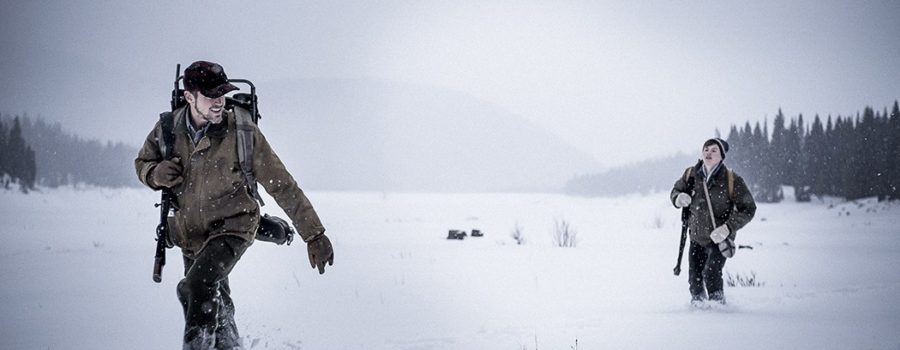[Published at Film Inquiry] Rural Montana is an incredibly beautiful and serene place. It’s one of the last predominantly untouched areas of the United States. With such beauty, immersed in nature, the wilderness is inherently isolating at times, and in Walking Out‘s case, that isolation can lead to danger. One never knows what they might endure in the wilderness; battling harsh climatic elements, encountering a pack of wolves, reckless hunters, or, say, finding yourself in the middle of a grizzly bear family’s fight for survival.
Walking Out is part father-son drama, part survival thriller, part coming-of-age yarn, and part uncompromising horror film. But the part that connects with the audience most is its naturalistic, unfiltered portrayal of human realism. In this semblance of realism, at the heart of Walking Out are the performances of Matt Bomer and Josh Wiggins. Bomer, in particular, continues to astonish as an actor. Supporting the performances in Walking Out are Alex Smithand his twin brother, Andrew J. Smith’s unbridledly cut-throat adaptation of David Quammen’s eponymous short story, their breathtaking direction in navigating through the Montana wilderness, and cinematographer, Todd McMullen’s impressive breakthrough feature film debut.
Methodical Editing, Sound Mixing, Cinematography, & Helming
As evidenced in Walking Out, editor Michael Taylor is an artist in complete command of his craft. Viewers will notice a unique editing technique to cut between past and present throughout the film; Taylor treats a digitally shot film as if it is a piece of celluloid in the editing room, figuratively cutting each snippet of celluloid from the strip and meticulously rearranging it during flashbacks, acting as a celluloid surgeon, of sorts. During these flashbacks, which portray Bomer’s Cal’s father, Clyde (Bill Pullman) as a younger man hunting in the same wilderness, McMullen brilliantly recreates the celluloid degradation process, commonly referred to as “vinegar syndrome,” to give the audience a sense of passage of time, generational difference, and distortion of memory.
When you have an acetate film exposed to elements over time, the acetyl groups attached to the cellulose compromise their molecular bonds and secrete acetic acid, causing a sepia-hinted hue. The distorted imagery in these flashbacks heighten the differences between time periods. McMullen further cleverly uses this celluloid degradation effect to mark the beginning and ending of these flashbacks with finality by replicating the effect of pink, purple, and blueish flashes of light that transport the viewer from time period to time period (also a result of the acetyl and cellulose bond’s molecular destruction).
When one watches a damaged 35 mm film on projection, one may notice that these flashes do indeed happen at various moments throughout the film, including at the beginning and ending of its reels. McMullen also adds a shakiness to the flashbacks, creating a home video-like effect, capturing Pullman’s Clyde’s warm interactions with a younger Cal in flashes; immediate instances; a flurry of memories, scarring and joyous, resurfacing. Walking Out boasts one of the more impressive cinematography debuts in some time with McMullen.

As anyone who hasn’t been to Montana and has only seen its beauty in pictures, it’s easy to discern that in such wilderness, with the aforementioned accompanied isolation, there can be a deafening silence. Sound mixer Mike Matthews makes any hint of discord magnified, placing importance on sound, sneaking every noise (the click of a button, the slamming of a door, the haunting echo of a shot and the recoil of consequences that the shot may have) into the ears of the viewer. Matthews, perhaps most impressively, uses white noise and extended periods of silence in-between the dialogue to amplify the theme of family estrangement and loneliness.
The Smith twins have established themselves as bold auteurs, tackling consistent themes of flawed masculinity, father and son relationships, and love and loss through such a caring and continually evolving lens. They capture winter in Montana with such beauty and deliberately transformative camera techniques. With the help of Matthews, Taylor, and McMullen, the viewer doesn’t have to visit Montana to feel like they are there. As Cal and David’s situation grows more dire, the Smiths play around with focus (the viewer’s vision grows increasingly blurred, just as Cal and his son, Wiggins’ David’s vision likely is), scattershot camera movements and zooms, delirious camera angles, and hauntingly beautiful pans to convey their diminishing consciousness in the real world.
Man & Masculinity, Two Separate Facets
The male gender is considered “man,” even though society has also historically attributed humankind to the classification of “man.” I don’t need to explain how that is inherently problematic, as that’s readily apparent. What makes him a man is either the reproductive organs he was born with and a slight variation of different hormonal balances than the female gender, or whether or not he identifies as a male, regardless of the genitalia he was born with. Masculinity is defined as something having qualities traditionally attributed to men, such as strength and boldness. That’s not even a joke; look up uses of masculinity in any dictionary or thesaurus, and you’ll find that the word masculinity is often synonymous with power, courage, audacity, toughness. It not only implies that the female gender is inferior, it holds a standard that men think they have to live up to.
Matt Bomer has portrayed almost every version of man onscreen, conveying each version with different increments and iterations of masculinity, from vulnerable, to subservient, to vacant, to powerful, to stoic. In Walking Out, Bomer is the more traditional American male, most closely associated to the commonly recognized definitions of masculinity. Stoic is the perfect word for Bomer’s Cal. The word itself comes from a philosophical movement. Merriam-Webster defines a Stoic as: “a member of a school of philosophy founded by Zeno of Citium about 300 B.C. holding that the wise man should be free from passion, unmoved by joy or grief, and submissive to natural law.” The word has since been revised to an adjective describing somebody who is “apparently or professedly indifferent to pleasure or pain.”

Such is the overarching motto for man since humankind was intelligent enough to make tools, hunt, and build fires for survival: do not show emotion; for that matter, do not possess emotion at all, as it is emotion that makes man inferior. Ironically, whoever collectively agreed that this was man’s role in nature, was wrong; so wrong, in fact, that possessing emotion is what makes human beings and other intelligent lifeforms superior.
On the other end of the spectrum, one could make a highly informed guess as to what femininity is historically and societally associated with, and the great irony is that the female gender is far more superior than the male gender for not self-inhibiting human beings’ mind’s natural functions, thus possessing an exponentially greater emotional intelligence. Cal represents the backwards, old-fashioned view of “masculinity,” while his son, David, raised by his mother, represents the break-away from that traditional classification of masculinity through his expression of natural, healthy emotion and outward empathy.
Cal and David are different, but their opposing exterior demeanors don’t clash, but rather serve as a platform to find common ground between a father and a son. They must eventually come to terms with their generational differences as they experience a horrific encounter in Walking Out, and that is when the palpable terror kicks in, the realism, adding nuance to a blended story of white-knuckle survival and intimate and sincere human interaction.
No-Holds-Barred Horror
Walking Out belongs firmly planted within the horror genre, even if horror isn’t its main goal, or even secondary or tertiary goal. In fact, it is one of the scariest real-life films I’ve ever seen. And, as I always say, if anyone’s ever made a horror film, I’ve seen it, and this film flies right up the horror ladder, finding itself neck-in-neck with some of the great classics such as The Shining, Silence Of The Lambs, Audition, and Martyrs. Having said that, viewers should take precautions, as this will likely leave some scarring imagery that accompany its visceral themes that deeply affect the audience in a disturbing but wonderfully effective way, far long after viewing.
The Smith twins have provided one of the most truly shocking and successful 180-degree changes of pace and tone in any genre. Not even Ernst Reijseger’s, for the most part, off-putting, tone-deaf score can inhibit the Smiths, McMullen, Taylor, Matthews, and the actors from making Walking Out nauseatingly effective for its audience.
Reijseger doesn’t seem to have an idea what kind of film Walking Out is in its first two acts; his score is reminiscent of a neo-noir western, with the lazy, lethargic strings and careless, awkwardly playful and joyous plucking of a stand-up base to the point of contrasting the film’s tone. It appears he was trying to capture the magic of Nick Cave and Warren Ellis’ The Assassination Of Jesse James By The Coward Robert Ford’s score. However, different movie, different time period, and different themes; historical biopic, present-day, fictional family survivalist horror-drama. Fortunately, his score is quiet and minimal and eventually aligns tonal frequencies with the Smiths in the third act, leaving the horrific encounter with a family of grizzly bears at the forefront of the focus. This fateful encounter provides a quite literal rationale for naming the film “Walking Out.”

Underneath The Surface
Particularly for emotional guarded people, there is always something going on underneath the surface of one’s appearance. Cal is stoic for a reason; he suppresses his pain from a troubled childhood and several traumatizing experiences as a young man. In a time of crisis, however, this internalized storm can easily resurface. Cal is a broken man from hiding his emotions.
This subtext in-between the dialogue on paper that one can readily notice onscreen becomes an increasingly predominant theme as Walking Out’s swift, 95-minute runtime comes to a nail-biting close. Cal and David must literally walk out of the wilderness towards civilization after they are left for dead with near-fatal injuries. However, it is more than just literal for Cal and David.
Figuratively, Cal’s fight for survival as he tries to navigate back home from the vast, cold wilderness is a fight that he’s been battling for his whole life, in a sense. His opponent, grief and unspoken feelings, slowly leave him as he walks further and further from the place that he and his father used to hunt. Cal is finally letting go. Finally outgrowing “man’s” traditional self-destructive, societal, historical, and familial mold to be the emotional anchor that his son David needs at this pivotal moment of his adolescence.
Still, even further beneath all of these complexities in Walking Out, the Smiths offer an extremely timely plea against hunting for sport. They hammer their point so successfully, that I would be shocked if the more intelligent, evolved “hunters” in the world didn’t rethink their entire lives after viewing Walking Out, that is, if they have the courage to view it. The Smithsmake a point that there’s a line between hunting to live off of the land, and brutally murdering helpless animals for sport without remorse (Ahem, Donald Trump Jr.…ahem).
Walking Out: Love Is Life & Life Isn’t Anything Without Love
Bomer (tied with The Normal Heart in terms of commitment and sheer emotional power) and Wiggins both give respective career-best performances. Pullman has little screen time, but the veteran actor steals each scene he’s in, portraying a damaged man with a gentle heart and soul.
Among other things, Walking Out is a story about fleeting love across three generations of men within one family. It’s a lineage that has been tainted by a staggering disconnect between man and what society has traditionally interpreted as “masculinity” for the past 10,000 years. We are not animals anymore, we’ve evolved to have the privilege to feel and interpret complex emotions that allow us to deal rationally with our discomfit, parlous emotional situations. Somehow still, though, flawed masculinity has significantly hindered the amount of love in the world today, and the Smiths allow that sobering realization to slowly permeate the minds of their audiences long after the credits roll.
The Smith twins, McMullen, Matthews, Taylor, Pullman, Bomer, and Wiggins have crafted a truly special film with Walking Out. It is the twins’ masterpiece, and one has every reason to believe that they have quite a few more masterpieces in their collective future features left in them. Walking Out seamlessly blends several types of cinematic horror, visually and thematically, with a resoundingly touching story about masculinity, father and son relationships, love in a world of fleeting humanity, and humankind’s conflicted, at times violent duality.
What was your favorite theme in Walking Out? What’s your favorite Smith twins film?
Walking Out was released on October 6 via most major digital streaming platforms by IFC Films in the US.








Leave a Reply
Your email is safe with us.